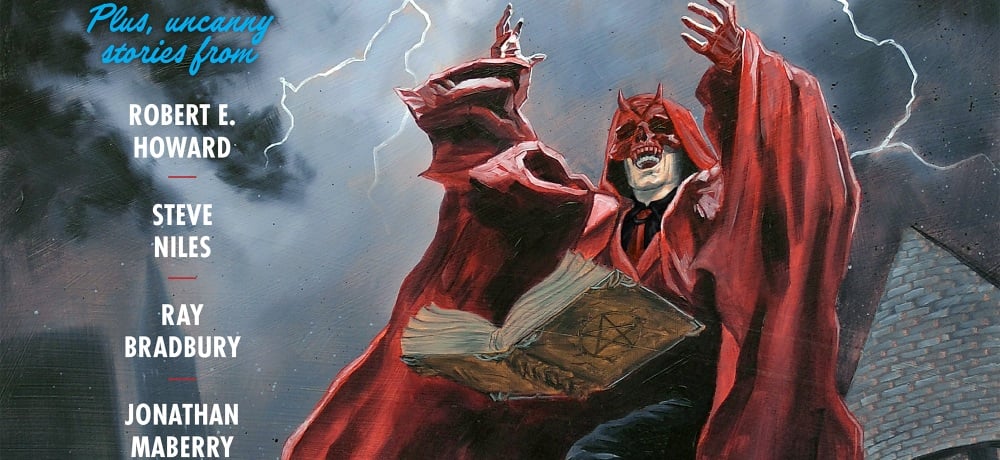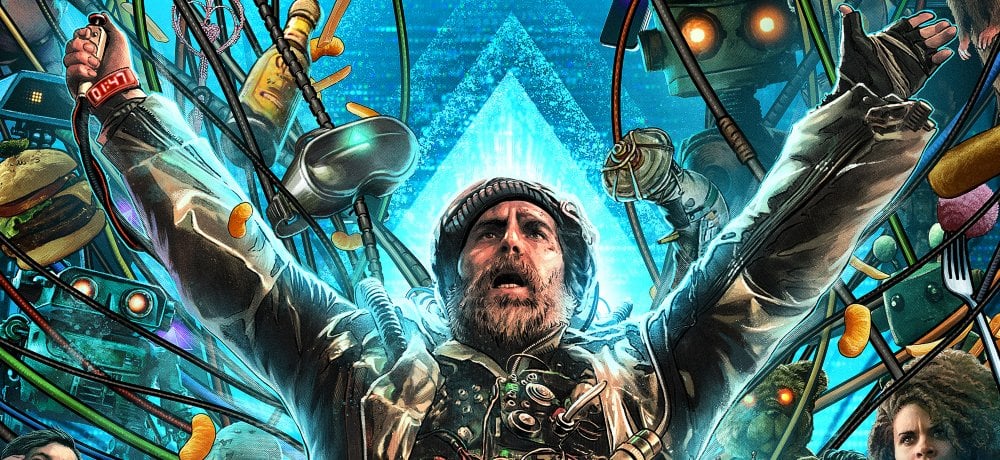





One of the more poignant genre films I’ve seen this year is After Midnight, which was written by Jeremy Gardner and co-directed by Gardner and Christian Stella. The film is centered around a couple, Hank (played by Gardner, who proves he’s a triple threat here) and Abby (the always excellent Brea Grant), who have been together a long time and are faced with some difficult decisions surrounding the future of their relationship. One day, Abby up and disappears, leaving Hank confused and distraught, but coincidentally enough, it’s at the same time he begins to believe a monster is after him, with everyone around him believing that his sanity is slipping away from him after Abby’s devastating departure.
After Midnight has been playing the festival circuit over the last few months (you can read my review out of Tribeca HERE), and most recently, it screened at the 2019 Fantastic Fest. It was in Austin where Daily Dead spoke with Gardner, Stella and Grant about their latest collaboration, where they talked about the inspirations behind After Midnight, the long journey to get the film made, the delicate art of not revealing too much of your monster, and more.
Congrats, you guys. This was my favorite film I saw out of Tribeca this year, and I’m glad it’s still making the festival rounds. Incidentally, I went through a divorce years ago, so there was a lot here that really spoke to me. I was hoping you guys could start off talking about how all of this initially came together. We've seen allegorical genre movies dealing with relationships before, but the way you guys approach it in After Midnight really rings true in a lot of ways. Especially for a lot of people right now who, when they hit a certain age, are struggling with this idea of what the hell do you do next?
Jeremy Gardner: I'm still worrying about that (laughs). No, I was in a 12-year relationship, and she was a wonderful person. It was just that it got to that point where I realized I wasn't doing as much of what I liked as I wanted to be doing, and I felt like she probably felt the same way, that she wasn't doing as much. She was very outdoorsy and I was more inward and focused, and trying to do art, so we were drifting apart in that regard. I was in a state where none of my friends were and I was away from everybody and all the stuff that I wanted to be doing. So I began thinking about the sacrifices that you make to stay in a relationship, when you're giving up part of who you are, and how that's just never a good idea for either party.
Then, I just saw this picture of a couch in front of a door in my head, and I started trying to figure out, why is that couch in front of a door, number one? So, it organically started rolling from there.
I know you guys have worked together for quite a while. Was there something in particular where you're like, "You know what? This is the next project.”
Christian Stella: When he finished the script, we knew we had to make this movie. But then it took us five or six years to actually get it made. Everybody always loved this script, but we just could not get it made for some reason for a long time.
Jeremy Gardner: And I'm not prolific enough a writer to have other options. I was like, " I poured my soul into this one, so am I going to do that again or are we going to get this thing made?"
Christian Stella: So, it went through a bunch of people trying to help get it made. But, during that time, you never stepped up and wrote another one so that’s on you (laughs). No, but everybody always was so wonderfully responsive to this thing, and it always felt like it was going to happen. And, luckily, Dave Lawson came into our lives. He's the best. We all love Dave to death.
So Brea, for you, I think what's interesting about your character is, obviously she does some things that are not great, in terms of how she deals with certain aspects of her life. And yet, she's not really the bad guy here. I think that's what's interesting about the way that you guys portray her character is that there's a validity to the things that she's feeling. And I think as somebody who didn’t quite do what you did in a literal sense, but more on an emotional level, your character really spoke to me. Especially because I saw it as her own way of focusing on her own self-preservation.
Brea Grant: I guess some of the things maybe she does may be viewed as not cool, but, for me, they feel completely justified. So, maybe that's just living in this character and thinking about what it's like to be with a person who doesn't want to commit to you, or doesn't want to be in this relationship with you, whatever it is. I think you're right when you said self-preservation. Make sure we're taking care of ourselves, and you will end up doing some selfish things. But to me, I don't know, Abby never seemed selfish. At least, she was just 100 percent about taking care of herself, which is why I really liked this script. I felt like both characters had actual, real inner lives and things that they cared about, and things that they wanted.
For me, just straight coming from an actress standpoint, there are so few roles written for the girlfriend-type character that are so flushed out. She has hopes, she has dreams, and she takes care of herself. She takes care of him. She has a full life going on, and that was so nice to read. And particularly women, when you start to get into your thirties, I love the genre world, but sometimes it can be lacking roles for women in their thirties and forties. And so, reading such a full character was so awesome for me. I never once doubted anything Abby did. I always felt like she made great decisions and I 100 percent would do the same thing. So, now you know what it's like to date me (laughs).
Jeremy Gardner: I'm obviously glad to hear that because I was a man trying to write a woman. And that's why I did tell her at the beginning of the process, I was like, "Look, I'm a fucking dude. If anything rings false to you here, take it and change it. She's yours, Abby is yours, please." But also, it was very important to me from the beginning that I didn't want to vilify anybody here.
Sometimes it's just like, "I got to do this for me." I was very nervous that people would vilify Abby before they understood why she was gone. Because you got to get to why she left before you understand why she left. Obviously, the audience will start to wonder, "Why did she leave?" That's why, thankfully, the flashbacks help to flesh her out a little bit before. Because if you were just with Hank the whole time that she was gone and then she came back, the audience would be mad at her. But because we got to see her, and slowly the souring of this rose-colored relationship, it put it on a level playing field, I hope.
Brea Grant: I felt like it was about neglect and the neglect of a relationship, and being with the person you want to be with. How when you're in a relationship, you move apart and you start doing these very selfish things. But it happens so gradually that you don't realize that it's happening.
Before we go, can you discuss the monster reveal? Because there's a subtlety to how you guys play with Hank's perceptions and also the audience perceptions where we're just going, like, "This guy's just completely off his rocker at this point." There’s a deliberation to the way you handle the monster in After Midnight that I really dug.
Jeremy Gardner: I think one of the things that's just, I won't say a happy accident, but it's good to have budgetary restrictions. Because if we didn't have budgetary restrictions, it would have still been subtle, but there would have been a lot more of monster, I think.
Christian Stella: There was definitely a version of the script with a lot more monster in it, for sure
Jeremy Gardner: There was a version with more monster, but they were always Jaws-ey scenes. It was always like that because you want to keep the audience guessing. You don't want to give anything away that’s concrete so early that you blast that concept of whether or not Hank’s lost his mind out of the water. But also, you don't have the money either, so you end up not being able to do as much of the monster that you wanted.
But there is an alternate reality where there's too much monster, and there's an alternate reality where there's more monster. I think we ended up with just the right amount because, in the end, it's not about the monster. It's about these two people, and sometimes there just happens to be a monster.
---------
Visit our online hub to catch up on all of our live Fantastic Fest 2019 coverage, including more reviews and interviews from the festival!